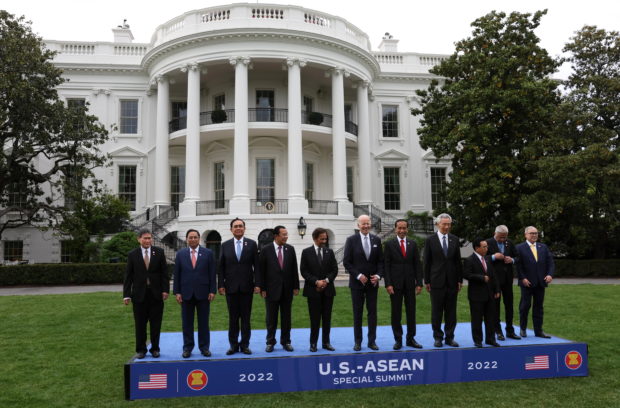With China in focus, Biden plans $150 million commitment to ASEAN leaders

U.S. President Joe Biden poses for a group photograph with leaders from the Association of Southeast Asian Nations (ASEAN) during a special U.S.-ASEAN summit at the White House in Washington, U.S., May 12, 2022. (REUTERS)
WASHINGTON – U.S. President Joe Biden will open a gathering of Southeast Asian leaders with a promise to spend $150 million on their infrastructure, security, pandemic preparedness and other efforts aimed at countering the influence of rival China.
On Thursday, Biden starts a two-day summit with the 10-nation Association of Southeast Asian Nations (ASEAN) in Washington with a dinner for the leaders at the White House before talks at the State Department on Friday.
His administration hopes the efforts will show the countries that Washington remains focused on the Indo-Pacific and the long-term challenge of China, which it views at the country’s main competitor, despite the war in Ukraine.
In November alone, China pledged $1.5 billion in development assistance to ASEAN countries over three years to fight COVID and fuel economic recovery.
“We need to step up our game in Southeast Asia,” a senior U.S. administration official told reporters. “We are not asking countries to make a choice between the United States and China. We want to make clear, though, that the United States seeks stronger relationships.”
Article continues after this advertisementThe new financial commitment includes a $40 million investment in infrastructure intended to help decarbonize the region’s power supply and $60 million in maritime security as well as some $15 million in health funding to aid in early detection of COVID-19 and other respiratory pandemics, an official said. Additional funding will help the countries develop digital economy and artificial intelligence laws.
Article continues after this advertisementThe U.S. Coast Guard will also deploy a ship to the region to help local fleets counter what Washington and countries in the region have described as China’s illegal fishing.
Still, the commitments pale in comparison to China’s deep ties and influence in the region.
Biden is working on more initiatives involving the region, including an infrastructure investment project called Build Back Better World and an Indo-Pacific Economic Framework (IPEF). But neither are finalized yet and are not expected to feature prominently in the announcements at this meeting.
The summit marks the first time that ASEAN’s leaders gather as a group at the White House and their first meeting hosted by a U.S. president since 2016.
Up to eight ASEAN leaders are expected. Myanmar’s leader has been excluded over a coup last year and the Philippines is in transition after an election, though Biden spoke to the country’s president-elect, Ferdinand Marcos Jr., on Wednesday.
ASEAN countries also share concerns about China and are broadly keen to boost ties with Washington.
China’s assertion of sovereignty over vast swathes of the South China Sea has set it against ASEAN members Vietnam and the Philippines, while Brunei and Malaysia also lay claim to parts.
But countries in the region have also been frustrated by a U.S. delay in detailing plans for economic engagement since former President Donald Trump quit a regional trade pact in 2017.
The IPEF is set to be launched on Biden’s trip to Japan and South Korea next week. But analysts and diplomats say only two of the 10 ASEAN countries – Singapore and the Philippines – are expected to be among the initial group of counties to sign up for the negotiations under IPEF, which does not currently offer the expanded market access Asian countries crave, given Biden’s concern for American jobs.
Analysts say that even though ASEAN countries share U.S. concerns about China, they remain cautious about siding more firmly with Washington, given their predominant economic ties with Beijing and limited U.S. economic incentives.
An adviser to Cambodian Prime Minister Hun Sen, in office since 1985 but making his first White House visit, told Reuters Biden should spend more time with leaders if he is serious about elevating ties with the region.
The adviser, Kao Kim Hourn, said Cambodia, which has close economic ties to China, would not “choose sides” between Washington and Beijing although U.S. investment in his country is growing.